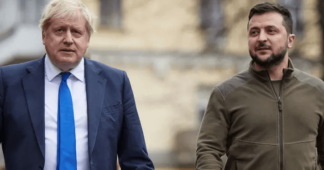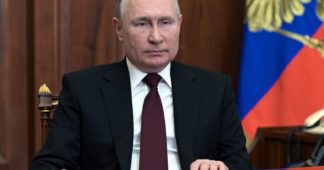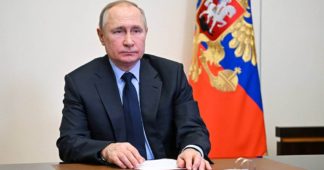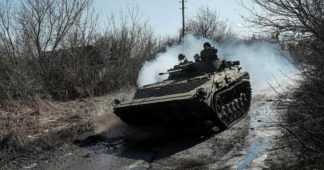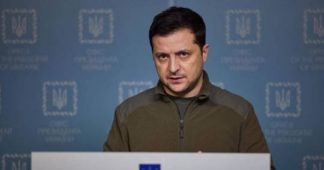The Russian leader expressed support for referendums and said a peace deal was possible earlier in the war but was sabotaged by the West
Posted on
Categories Russian President Vladimir Putin on Wednesday ordered a partial mobilization that will call up 300,000 reservists and warned Western countries that Moscow would use nuclear weapons to defend its territory.
The move marks Putin’s biggest escalation of his war in Ukraine since launching the invasion on February 24, although he is still framing the war as a “special military operation.”
“If the territorial integrity of our country is threatened, we will without doubt use all available means to protect Russia and our people — this is not a bluff,” Putin said in a televised address.
“The citizens of Russia can rest assured that the territorial integrity of our Motherland, our independence, and freedom will be defended — I repeat — by all the systems available to us. Those who are using nuclear blackmail against us should know that the weathervane can turn around,” he said.
Putin didn’t specify the number of reservists that will be activated under the partial mobilization, but the Kremlin later clarified it will be 300,000, which Defense Minister Sergey Shoigu recommended. Putin said Russia will call up “Only those citizens who are currently in the reserve and primarily those who served in the army and have particular military specialties.”
The Russian leader expressed support for referendums on joining Russia that will be held in each area of Russian-controlled Ukraine from September 23-27, which were announced on Tuesday. Referendums will be held in the self-declared Donetsk and Luhansk republics in the Donbas region, and in the oblasts of Kherson and Zaporizhzhia.
“I would like to emphasize that we will do everything necessary to create safe conditions for these referendums so that people can express their will. And we will support the choice of future made by the majority of people in the Donetsk and Luhansk people’s republics and the Zaporizhzhia and Kherson regions,” Putin said.
Putin made clear that he blames the US and its allies for the current situation and said a peace deal was possible earlier in the war after Russian and Ukrainian negotiators held talks in Istanbul. He said that he was making the details of the peace talks public for the first time.
“After the start of the special military operation, in particular after the Istanbul talks, Kyiv representatives voiced quite a positive response to our proposals. These proposals concerned above all, ensuring Russia’s security and interests,” he said.
Reports in Western media and Ukrainian media have also said that a deal was close after the Istanbul talks, which were held at the end of March. But according to a report from Ukrainska Pravda, former British Prime Minister Boris Johnson traveled to Kyiv in April and told Ukrainian President Volodymyr Zelensky that even if he was ready to sign a deal with Putin, the collective West was not.
“A peaceful settlement obviously did not suit the West, which is why, after certain compromises were coordinated, Kyiv was actually ordered to wreck all these agreements,” Putin said.
The Russian leader said that Washington, London, and Brussels were now “openly encouraging Kyiv to move the hostilities to our territory.” After Ukraine launched its successful counteroffensive in the northeastern Kharkiv region, shelling was reported in Belgorod, the Russian region that borders the area.
Putin said that the focus will remain on “liberating” the Donbas region. Russia and Russian-backed forces in the region currently control virtually all of the Luhansk oblast, but Ukraine still controls a portion of Donetsk.
We remind our readers that publication of articles on our site does not mean that we agree with what is written. Our policy is to publish anything which we consider of interest, so as to assist our readers in forming their opinions. Sometimes we even publish articles with which we totally disagree, since we believe it is important for our readers to be informed on as wide a spectrum of views as possible.
